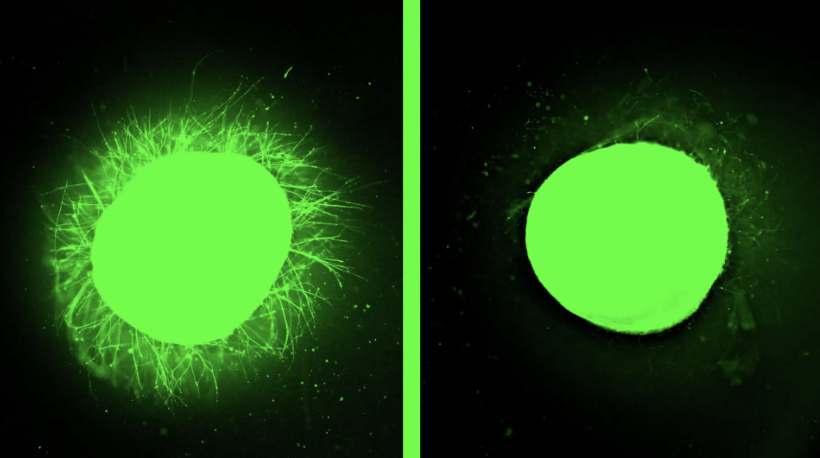A Tumor-on-a-Chip for CAR-T Cell Research
Journal: Nat Biotechnol (2025).
Author: Liu, H., Noguera-Ortega, E., Dong, X. et al., USA/ Republic of Korea
A new Nature Biotechnology study introduces a microengineered “tumor-on-a-chip” system that allows researchers to vascularize human tumor samples and perfuse them with immune cells – providing a realistic platform to study CAR-T cell activity in solid tumors. Using lung adenocarcinoma and malignant pleural mesothelioma models, the team demonstrated how this chip can visualize CAR-T cell behavior, test engineered CAR-T strategies, and even uncover metabolic biomarkers and druggable targets that may enhance CAR-T efficacy. This innovation offers a powerful in vitro tool to accelerate the development and optimization of adoptive cell therapies for cancer.
Toward Xeno-Free Vascular Organoids
Journal: Sci Rep 15, 36042 (2025).
Author: Giles, R., Meijer, E.M., Maas, R.G. et al., The Netherlands
Researchers have identified animal-free alternatives to Matrigel for culturing human iPSC-derived blood vessel organoids (BVOs) – a key step toward more reproducible and clinically relevant vascular models. The study, published in Scientific Reports, found that Vitronectin effectively replaces Matrigel in iPSC culture while maintaining pluripotency, and that fibrin-based hydrogels can support 3D vascular organoid formation with comparable vascular network development. This Matrigel-free protocol advances the field toward xeno-free, standardized culture systems, enhancing the potential of vascular organoids for disease modeling, tissue engineering, and personalized therapeutic screening.
Collagen IV Linked to Higher Breast Cancer Mortality Risk
Journal: BJC Rep 3, 73 (2025).
Author: Rask, G., Jansson, M., Svensson, J. et al., Sweden / Finland
A new study in BJC Reports identifies stromal collagen IV as a potential biomarker for poor outcomes in patients with ductal carcinoma in situ (DCIS). Analyzing tissue samples from women treated for DCIS, researchers found that high collagen IV expression in the tumor stroma was strongly associated with increased risk of breast cancer death, even after accounting for traditional clinicopathological factors. In vitro, triple-negative breast cancer cells also showed enhanced motility on collagen IV – coated surfaces, suggesting a role for collagen IV in promoting tumor aggressiveness. These findings highlight collagen IV as a promising marker for risk stratification and as a potential target for reducing progression after DCIS.
Macrophages Identified as Acetate Source Fueling Liver Cancer Metastasis
Journal: Nat Metab (2025).
Author: Shen, L., Wang, S., Gao, C. et al., China
A Nature Metabolism study reveals that tumor-associated macrophages (TAMs) act as an acetate reservoir that fuels hepatocellular carcinoma (HCC) metastasis. The researchers discovered that HCC cells release lactate, which triggers a lipid peroxidation – ALDH2 pathway in TAMs, leading them to produce and secrete acetate. This acetate is then taken up by HCC cells to sustain high acetyl-CoA levels, promoting metastatic potential. Blocking ALDH2 activity or lipid peroxidation in TAMs significantly reduced cancer cell migration and lung metastasis in mouse models. The findings uncover a metabolic crosstalk between macrophages and tumor cells, highlighting TAM-derived acetate as a potential therapeutic target to limit HCC metastasis.



